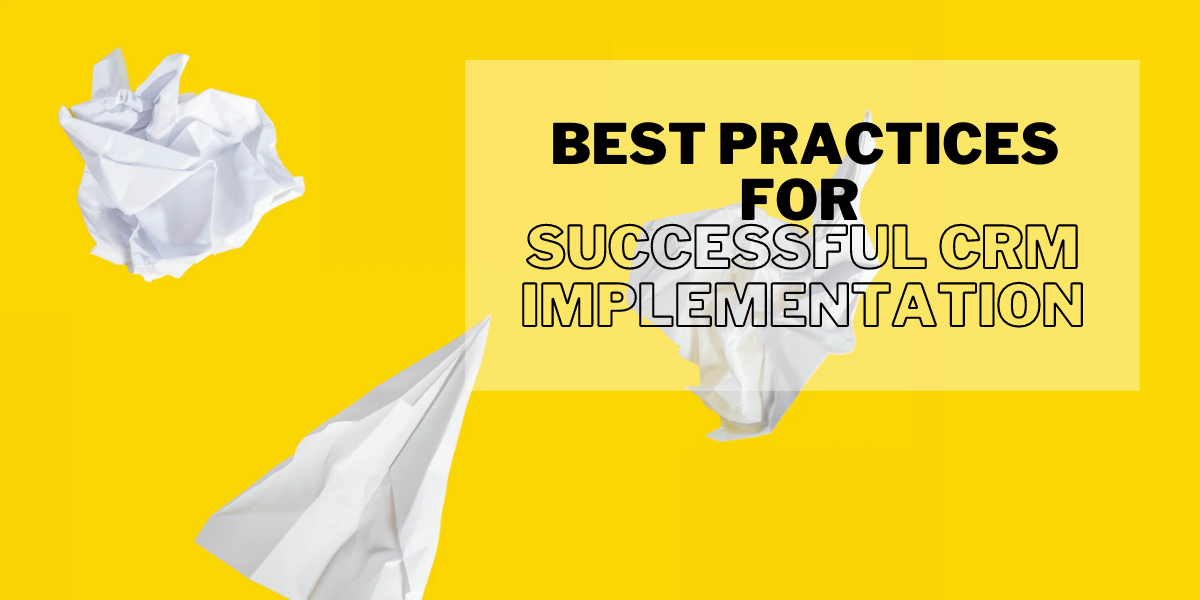Best Practices For Successful CRM Implementation
One of the most significant steps that are considered in enabling your organization to become ready for success is the right implementation of a CRM system. When you will have the right CRM system in place, it means that your organization will be capable of advanced communication, better relationships, and efficient daily interactions that will enable your team to work a lot better. CRM implementation will also mean that your management is now in a position to have a clear understanding of all that is needed to make your organization run.
That being said, it must be noted that effective CRM implementation can be a tricky thing. CRM systems may fail in absence of vision and proper planning. All organizations have to consider their size, various operations, existing infrastructure, installation plans, etc. The most important thing that must be done is the creation and implementation of a CRM data plan which will ensure that no data is duplicated within the CRM system.
As an organization that is looking forward to a CRM implementation, it is necessary to have an efficient and process-oriented strategy that helps in implementing a CRM system. It must also be noted that even though a CRM system can be up and running perfectly, many times you might face some challenges in the system.
In order to ensure that the implementation is as effective as possible, it can be a great option to consult a CRM specialist. They will not only help you in successful implementation, but they will also guide you towards finding any probable loopholes that might be hampering your implementation efforts.
In this blog, we will list some of the best practices for successful CRM implementation. Let’s have a look at them one after another for a better understanding.
1. Choosing a suitable CRM: Before spending time on the process needed for a successful implementation, it is very important to understand that all CRMs are not the same and they are definitely not created equal. When you choose a CRM without comprehensive research about all that it can offer to you then chances are highly likely that you will end up choosing something that is not suitable for your business.
You have to find the answers to factors like if your CRM should be operating on the cloud or if it must be located on-site. Additionally, you must be clear if you want your CRM system to require a service contract or if you want something that costs more upfront during the installation.
You have to understand if your organization needs comprehensive and customizable features or is it going to be okay with the basic functionality. Remember to take your time and weigh out all of your options while knowing what is it that you need to make any final decisions beforehand.
2. Make a Planned Strategy: This is the step where you are supposed to identify all that is critical and needed for going live. This is where you decide what every department considers as an important need so that everything can be outlined and prioritized accordingly. Making a planning strategy involves including all the resources and their availability so that additional support can be leveraged and a professional can be made responsible to work on the customizations before going live.
After you are done with this, make sure that you make a plan of when you will go live. It is best to do with the assistance of CRM consulting so that you ensure maximum precision. There are times when going live gets delayed due to problems like compliance issues in the legacy systems. It can be helpful to update the timeline for ensuring practical and streamlined leadership.
You can also communicate with all departments so that you gain clarity about when all of them are ready to go live. All through the project of CRM implementation, it is necessary that you do not forget to keep changing the expectations with the key stakeholders involved so that they can do what is important to them like important reports, etc. Following these rules in the planning strategy will end up being extremely helpful down the line.
3. Understanding the Users: One of the most successful deployments of CRM is that takes into consideration all that a user needs, not just the top sales representatives, the ones who enter the data into the system, or the ones who are technologically efficient. Instead of this, the CRM implementation depends on choosing a solution, exploring a cross-section of the CRM clients right from marketing, IT, customer service, finance, sales, etc. so that their input can be taken seriously.
It is extremely necessary to gain a good understanding of the ways in which the users work. It is only after you understand how the users work, will you be able to explore how they would like to work in the future. The entire look and the feel of CRM are going to play a major role in deciding how the CRM is going to look like.
When you take into account the needs and the preferences of all those will be utilizing the CRM by choosing a solution with an interface that feels comfortable, there will be a much better chance of smooth and an organization-wide adoption.
4. Train Your Workforce Well: The benefits that come with a successful implementation of a CRM are well known. There are not many people who would argue about them that often. In fact, the investment return on a CRM system is also amazing and beneficial for an organization.
On the contrary, if an organization somehow fails to educate its employees effectively on the steps to use the CRM then the complete tool does not fetch the results that it is capable of realizing. In times like these, it becomes extremely necessary to go forward with the assistance of CRM consulting.
At the time when you are implementing your CRM, focusing on the training of your employees will always end up being extremely helpful. By doing this, you will enable them to gain better clarity of the information that is presented. You can also test your employees on all that they have learned by offering them periodic training which ensures that everything gets retained well.
5. Stating the Rules: A CRM system is only as effective as a business will allow that system to become. In case the workforce of an organization does not use that system to its complete potential or if they end up misusing it then the CRM will not be rendered that efficient to perform the functions that it was originally capable of performing otherwise.
You can begin by stating a detailed list of all the rules that can be related to the use of CRM so that everyone in the organization is on the same page when it comes to the working of the CRM. In addition, you can also implement a company rule that all new leads will be processed through the CRM barring absolutely any exceptions.
When we enforce the correct use of the CRM system as soon it gets established, you can guarantee a smooth transition and a much more unified team. This eventually helps in evening out the things as far as a productive CRM implementation is concerned.
6. Make Collaboration Important: One of the major benefits of CRM system over multiple traditional systems is that it comes with a potential to improve cooperative efforts. When the same information is made accessible across various departments, CRMs help in getting rid of any confusion that might come with having too many loopholes.
There are many consumers who have experienced being transferred from the agent to agent model without any resolution of a problem, which ultimately ends up leading to client frustration and a drop in the overall revenues.
With the help of CRM, irrespective of whether a customer is speaking with one salesperson, a marketing professional, or an information technology leader, everyone involved can have access to the same programs and the information that is needed to provide the best customer service possible. What this means is that the collaboration within an organization will have the same continuity and productivity as it would in case it was being handled by a single employee only.
7. Depending on Automation: The CRM implementation is carried out to help your business by doing most of the heavy lifting when it comes to managing customer relationships. This is directly proportionate to the fact that multiple tasks that are otherwise associated with the data entry can become automated.
You can take advantage of this automation wherever possible. In addition to decreasing the chances of making an error, this will end up finding its way into your system. It might also free up your employees from wasting time on minimal or the tasks that are supposed to be repeated.
8. Proper and Organized Data: Any CRM system is essentially designed to record and organize a huge amount of data. The main problem is the fact that many organizations do not bother turning this data into anything substantial or actionable. CRMs are designed to capture and organize a large amount of data.
The best CRMs are actually the ones that come with a built-in analytics feature, which uses advanced programming for mining all the recorded data and to use that information that is needed to produce valuable conclusions that can be used for taking informed future business decisions.
In case you fail to do a proper analysis of the data that your CRM records then all the valuable information does a little more than taking the storage space.
9. Simple to use: When you will begin by encountering a combination of different CRM options then often you will be tempted to invest in something that ends up becoming a lot more difficult than you need it to be.
Be careful and remember that the best CRM system is the one that fits your needs perfectly. There is no need to go out of the way and invest in something that will not be useful. Take the suggestion of a CRM specialist to make the right choice. This will make sure that your team takes complete advantage of the CRM without worrying about anything unnecessary.
Conclusion:
While adopting the best practices for successful CRM implementation, you must also be willing to make necessary changes to the CRM policies anywhere it is necessary. The long term benefits and the effectiveness of everyday operations is the best indicator for explaining whether CRM is capable of performing on the basis of your expectations.
Encaptechno is an organization that has a team of expert CRM specialists that offer the best CRM consulting. Let the team of Encaptechno revolutionize the way in which you do your business by choosing CRM consulting today.


No comments